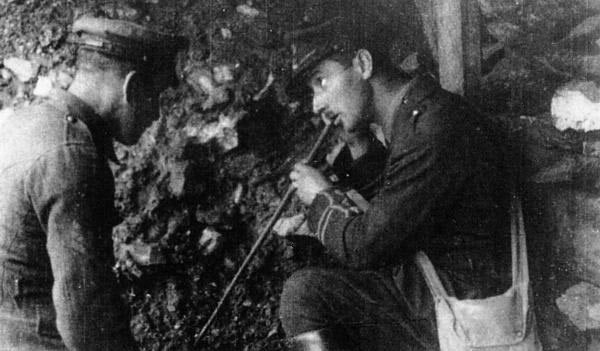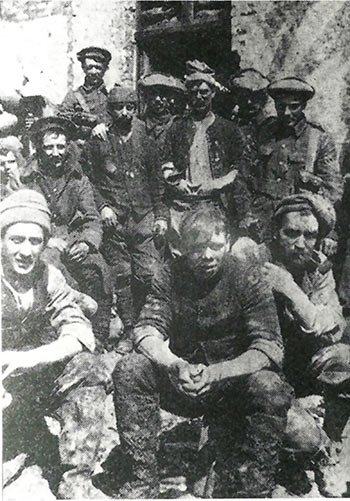Welsh miners were in the front line of underground warfare. Helen Morgan from Abergavenny Local History reports.

Listening for the enemy – IWM FLM 198
Tunnelling has been a tool of warfare since the Bronze Age when warriors undermined their enemies’ walls, causing them to collapse. It went out of favour in medieval times. But in 1914 the Germans revived it as a means to shake up trench warfare in the Flanders mud. They dug their first tunnels and exploded 10 mines under a brigade of Indian troops. The British response was to form their own ad hoc tunnelling units, drafting in miners from Monmouthshire.
Arthur Edwards was the son of the general manager of the Blaenavon Coal & Iron Company and had worked as a mining engineer before becoming a surveyor. He was also a Captain in the Monmouthshire regiment and had landed in France with the 2nd Battalion in November 1914. Within weeks, he was in command of the 4th Division Mining party. After a few mishaps, their first success came when they blew up a row of cottages behind the German trenches that had harboured troublesome snipers.

Some of the 2nd Monmouthshires
Soon afterwards specialist tunnelling companies under the direction of the Royal Engineers began to replace the ad hoc units. Private Garfield Morgan from Pontypridd was serving with the South Wales Borderers when the he heard the call to volunteer for special duties. He hesitated — until he heard that the pay was six shillings a day. Morgan was one of dozens from Wales who stepped forward. It was dangerous work and had to be carried out in silence as the Germans were also digging tunnels under No-Man’s Land. On one occasion Morgan and his buddy, Albert Rees, broke through into a void. They extinguished their candles and heard a foot splash in water on the other side. Morgan was later gassed but survived the underground battles on the Western Front and returned home to tell the tale.
Captain W.H. Rees from near Swansea spent most of the war under Messines Ridge. On the evening of 6 June 1917 his commander said: “Gentlemen, we many not make history tomorrow, but we shall certainly change the geography.” A few hours later, Rees and his men fired 19 mines under the German trenches, killing10,000 Germans. The firing marked the opening of the battle of Ypres and was heard as far away as Dublin.
Peter Walker’s talk on Tunnelling to Victory at the Borough Theatre on January 21st starts at 7.30pm. Non-members are welcome to join on the night.
www.abergavennylocalhistory.org.uk.

